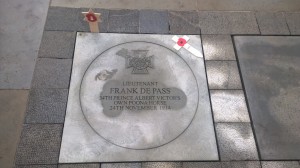The first Jewish recipient of the Victoria Cross has been honored with a permanent memorial in central London, a century after his bravery during the First World War earned him the Victoria Cross.
Lieutenant Frank de Pass, who was also the first Indian Army Officer to receive Britain’s highest military honour for saving a fellow soldier, became the latest WW1 hero to have a special paving stone laid in his honour as part of a Government initiative marking the anniversary OF The Great War.
On 24 November 1914 while serving in France, Lieutenant de Pass – who was born to a family of Spanish/Portuguese Jews who originally came to England in the 1660s – rescued, under heavy fire, a wounded man lying exposed to enemy bullets.
The next day, 100 years ago today, 27-year-old Lieutenant de Pass was shot and killed by an enemy sniper after engaging the sniper to protect his men whilst supervising the repair of a parapet.
Placed close to the Ministry of Defence during today’s solemn ceremony in Whitehall, the stone was blessed by the Military chaplain Rabbi Reuben Livingstone in the presence of de Pass’s grandson, Lieutenant Colonel Jonny Kitson, and Sergeant Johnson Beharry VC, the first living recipient of the Victoria Cross in over 30 years.
Speaking after the event – which was also attended by the Head of the Association of Jewish Ex-Servicemen and Women and veterans from the Royal British Legion – Communities Secretary Eric Pickles said: “Lieutenant de Pass displayed exceptional courage one hundred years ago, in the cause of liberty. The legacy of men like Frank and their acts of supreme valour in service of their country is the Britain of today, united by shared values, where there is mutual respect and tolerance of all faiths.
“Over the course of the centenary, we have the opportunity to stop and reflect on these great displays of bravery and by the laying of commemorative stones we will ensure that there are permanent memorials to all of our First World War heroes.”
His “In Memoriam” booklet at the National Army Museum contains a passage states: “Many brave deeds have been performed during the war, but there are few instances of gallantry more conspicuous than that displayed by this heroic young soldier. He was the very perfect type of the British officer.
“He united to singular personal beauty a charm of manner and a degree of valour which made him the idol of his men. He was honoured in death by the Victoria Cross. No one in the war earned in better.”
A total of 469 VC recipients will be similarly recognized with special paving stones in England, Scotland, Wales and Northern Ireland over the coming four years.

